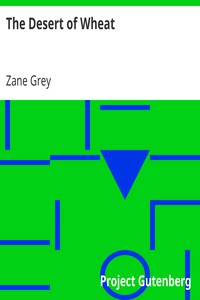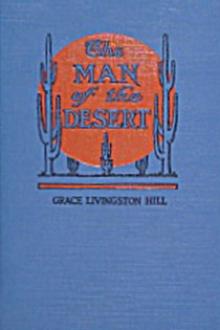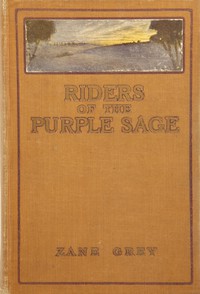The Desert of Wheat, Zane Grey [good non fiction books to read .TXT] 📗

- Author: Zane Grey
Book online «The Desert of Wheat, Zane Grey [good non fiction books to read .TXT] 📗». Author Zane Grey
"Whew! They blew up the gasoline-shed!" he soliloquized. "But some of them miscalculated, for if I don't lose my guess there was a bunch of I.W.W. closer to that gasoline than I was.… Some adventure!… I got another punch at Glidden. I felt it in my bones that I'd get a crack at him. Oh, for another!… And that Bradford! He did make me think. How he slugged Glidden! Good! Good! There's your old American spirit coming out."
Kurt sat down to rest and to listen. He found he needed a rest. The only sound he heard was the rumbling of a train, gradually drawing away. A heavy smoke rose from the freight-yard, but there were no longer any blazes or patches of red fire. Perhaps the explosion had smothered all the flames.
It had been a rather strenuous evening, he reflected. A good deal of satisfaction lay in the fact that he had severely punished some of the I.W.W. members, if he had not done away with any of them.
When he thought of Glidden, however, he did not feel any satisfaction. His fury was gone, but in its place was a strong judgment that such men should be made examples. He certainly did not want to run across Glidden again, because if he did he would have blood on his hands.
Kurt's chance meeting with the man Bradford seemed far the most interesting, if not thrilling, incident of the evening. It opened up a new point of view. How many of the men of that motley and ill-governed I.W.W. had grievances like Bradford's? Perhaps there were many. Kurt tried to remember instances when, in the Northwest wheat country, laborers and farmers had been cheated or deceived by men of large interests. It made him grave to discover that he could recall many such instances. His own father had long nursed a grievance against Anderson. Neuman, his father's friend, had a hard name. And there were many who had profited by the misfortune of others. That, after all, was a condition of life. He took it for granted, then, that all members of the I.W.W. were not vicious or dishonest. He was glad to have this proof. The I.W.W. had been organized by labor agitators, and they were the ones to blame, and their punishment should be severest. Kurt began to see where the war, cruel as it would be, was going to be of immeasurable benefit to the country.
It amazed Kurt, presently, to note that dawn was at hand. He waited awhile longer, wanting to be sure not to meet any lingering members of the I.W.W. It appeared, indeed, that they had all gone.
He crossed the freight-yard. A black ruin, still smoldering, lay where the elevators had been. That wonderful wheat yield of his had been destroyed. In the gray dawn it was hard to realize. He felt a lump in his throat. Several tracks were littered with the remains of burned freight-cars. When Kurt reached the street he saw men in front of the cottages. Some one hailed him, and then several shouted. They met him half-way. Jerry and Olsen were in the party.
"We was pretty much scared," said Jerry, and his haggard face showed his anxiety.
"Boy, we thought the I.W.W. had made off with you," added Olsen, extending his hand.
"Not much! Where are they?" replied Kurt.
"Gone on a freight-train. When Jerry blew up the gasoline-shed that fixed the I.W.W."
"Jerry, did you do that?" queried Kurt.
"I reckon."
"Well, you nearly blew me off the map. I was running, just below the shed. When that explosion came I was lifted and thrown a mile. Thought I'd never light!"
"So far as we can tell, nobody was killed," said Olsen. "Some of our fellows have got bullet-holes to nurse. But no one is bad hurt."
"That's good. I guess we came out lucky," replied Kurt.
"You must have had some fight, runnin' off that way after the I.W.W.'s. We heard you shootin' an' the I.W.W.'s yellin'. That part was fun. Tell us what happened to you."
So Kurt had to narrate his experiences from the time he stole off with the big shot-gun until his friends saw him again. It made rather a long story, which manifestly was of exceeding interest to the villagers.
"Dorn," said one of the men, "you an' Jerry saved this here village from bein' burned."
"We all had a share. I'm sure glad they're gone. Now what damage was done?"
It turned out that there had been little hurt to the property of the villagers. Some freight-cars full of barley, loaded and billed by the railroad people, had been burned, and this loss of grain would probably be paid for by the company. The loss of wheat would fall upon Kurt. In the haste of that great harvest and its transportation to the village no provision had been made for loss. The railroad company had not accepted his wheat for transportation, and was not liable.
"Olsen, according to our agreement I owe you fifteen thousand dollars," said Kurt.
"Yes, but forget it," replied Olsen. "You're the loser here."
"I'll pay it," replied Kurt.
"But, boy, you're ruined!" ejaculated the farmer. "You can't pay that big price now. An' we don't expect it."
"Didn't you leave your burning fields to come help us save ours?" queried Kurt.
"Sure. But there wasn't much of mine to burn."
"And so did many of the other men who came to help. I tell you, Olsen, that means a great deal to me. I'll pay my debt or—or—"
"But how can you?" interrupted Olsen, reasonably. "Sometime, when you raise another crop like this year, then you could pay."
"The farm will bring that much more than I owe Anderson."
"You'll give up the farm?" exclaimed Olsen.
"Yes. I'll square myself."
"Dorn, we won't take that money," said





Comments (0)